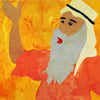Joel Cohen's Question:
Korach, along with Dathan, Abiram and On, supported by 250 leaders, confronted Moses and Aaron: "It is too much for you…why do you exalt yourselves over the Congregation of G‑d?" In response, Moses fell on his face, and said: "In the morning G‑d will make known who is His own, and the holy one He will draw close to Himself..."
Moses and Aaron prayed that G‑d not become angry with the overall assembly and instructed the assembly to remove themselves from Korach and his collaborators to save themselves. Then, curiously, Moses—without G‑d describing to him the means of the rebels' destruction—warned the assembly that G‑d would open the earth and swallow the rebels. And it occurred precisely as Moses foretold.
- This story presents a rebellion against earthly leaders. Doesn't it demonstrate the flaw in a theocratic state, whose leaders can't be challenged?
- Was it right for Moses to importune G‑d to destroy his personal enemies?
- Doesn't this incident show that Moses was a poor leader? After all, Korach couldn't possibly have won over the group if the Nation at large didn't resent Moses.
Rabbi Adam Mintz Responds:
Joel, I think that you have raised some interesting questions regarding Moses' leadership as reflected in the story of the rebellion of Korach. Most importantly, does Moses' response to Korach signify a weak leader as he would have been much better served had he ignored Korach?
I would like to suggest two answers: First, Moses felt that this rebellion was not only against his leadership but also against G‑d's leadership. In this vein, Moses felt the obligation to announce to the people that G‑d was the ultimate leader and that Korach had sinned by questioning G‑d and His choice of Moses as leader. This approach would explain the dramatic splitting of the earth and the swallowing up of Korach. What better way than a miracle to signify that G‑d is right and Korach is wrong?
However, there is a second way to understand the story. According to this explanation, following the story of the spies, Moses was indeed a weakened leader. Throughout the year since they had left Egypt, Moses had proven to be an amazing leader who defended his people before the Almighty, and every act they took at his instruction had been blessed. Suddenly, though the spy mission had Moses' blessing, the people ended up being punished by G‑d with forty years of wandering, and the spies themselves died instantly. Moses seemed to have failed in his representation of the people over a fiasco that he had brought about. While the people had asked for the spies, couldn't Moses have orchestrated the mission more appropriately to avoid the problems that ensued?
At this point, Moses is very vulnerable as a leader. And to make matters worse, he is once again challenged, this time by Korach, a member of his own family about his qualifications for leadership. And, at that decisive moment those criticisms hurt the institution of leadership that Moses had stood for more than we can imagine.
Given this background, we can understand why Moses did not allow the rebellion to run its course and fizzle. He did that by annihilating Korach and his supporters.
As we watch the unfolding saga of the world's leaders at the beginning of the twenty-first century, we can't help but realize that the challenges of leadership remain very similar to the challenges that Moses felt over three thousand years ago.
Rabbi Eli Popack Responds:
If democracy is a good thing, why should G‑d have the sole deciding power as to how we go about our lives? Let's take a vote, and give someone else equal opportunity to dictate our fate and run our world. Sounds ludicrous, no?
Well, that's exactly why Korach's rebellion is so unacceptable by the Torah. Every member of this nation had heard G‑d communicate with Moses at Mt. Sinai. Every member knew with absolute certainty that G‑d chose Moses to take them out of Egypt. Moses was indisputably G‑d's chosen leader. So what exactly makes Moses' leadership more of a theocracy than G‑d's own control of the world?
Thus, Moses says, "With this you shall know that G‑d sent me to do all these deeds, for I did not devise them myself." Is he asking G‑d to fight his personal battles or are his battles the battles of G‑d Himself? And if they are his own, why is G‑d so quick to split the earth to bury these people alive?
This is true not only about Moses, but indeed this is the Jewish attitude towards our prophets and sages throughout the generations. The Talmud (Sanhedrin 110a) learns the laws of valuing Torah teachers (which far exceed the respect that we accord any human leadership) from the story of Korach. To quote:
Rabbi Chisda said: Whoever contends against the ruling of his teacher is as though he contended against the Shechinah (divine presence), as it says, "Dathan and Abiram, the chosen of the congregation, who incited against Moses and Aaron in the assembly of Korah, when they incited against G‑d" (Numbers 26:9).
So Joel, are we up for a regime change? Are we voting G‑d out?





